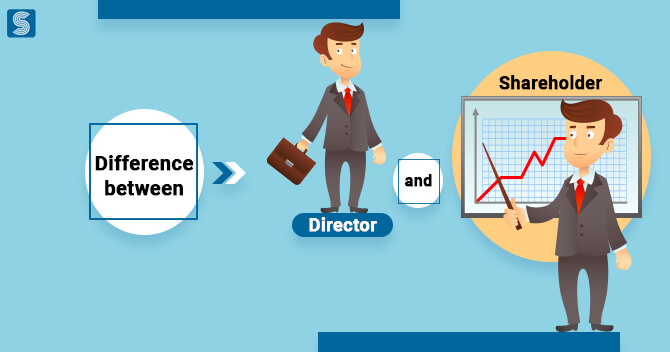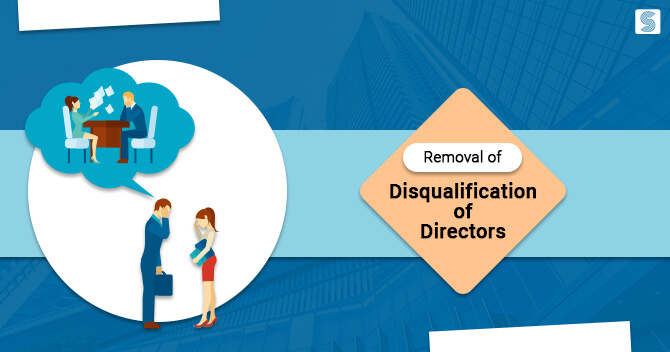What is the Difference between Director and Shareholder?

Dashmeet Kaur | Updated: Jan 18, 2020 | Category: DIN
The foundation of a company stands upon two heads, namely director and shareholder. Both the directors and shareholders perform distinctive roles in the company. The shareholders possess an authoritative position to appoint the directors. Since a shareholder purchases the share of a company, therefore he becomes the owner while the director manages the company’s operations. It is often misinterpreted that the shareholders have no power to participate in the functions of the company despite being the owner. Thus, this blog will nullify all the confusion regarding the responsibilities of a director and shareholder. Also, it will highlight the difference between director and shareholder.
Table of Contents
Who is the Director?
The director of a company is an individual appointed to manage and supervise the different areas on the shareholder’s behalf. Section 177 of the Companies Act, 2013 regulates the power and duties of a company’s director. The executive and non-executive directors owe a duty to the company instead of the shareholders. All the directors must drive only those powers which the company’s constitution grants them. Moreover, the director should promote the company’s success at all times. There is a huge difference between director and shareholder of a company which is evident from the duties they perform.
Also, Read: What are the Legal Requirements to Register a Small Firm in India?
Duties of the Director under Companies Act, 2013
As said earlier, both shareholders and directors play diverse roles in a company. Let’s look at the principal duties of the director:
- Individually make major decisions: A director has to exercise independent judgment and take significant decisions for the welfare of the company. Besides, his decisions must not contradict the company’s constitution or any agreement under which he was assigned.
- Promote the success of a company: Every action of the director should be for the company’s good faith. As the directors, singlehandedly takes decisions, so it has to be beneficial for each member and company as a whole. Generally, success implies the long-term increase in value. However, it depends on the director’s decision. Before imposing any decision, the director must contemplate whether it will lead to success or not.
- Bypass any situation that may result in conflicts: The director has to avoid a circumstance that can incur conflicts or can raise disputes. It applies to the exploitation of any information, property or opportunity, regardless of the company, could leverage the situation.
- Not accept any benefits from a third-party: It is forbidden to receive favors from the third parties for a director. Such duty contravenes when the director takes benefits from a third party, and it does not result in the conflict of interest. This way directors shares some considerable differences with shareholders.
What is the Process of Decision-making for a Director?
Once the director decides on the course of action, he thereon summons a Board Meeting. During the meeting, each director shares their opinion individually and shows interest in the proposed decision. When all the directors approve of the proposed business plan, then the nominated directors shall implement the transaction. It includes internal administration; for instance, during the appointment of a director, the board updates the director’s register and any correspondence. While the external administration then files at Companies House within 14 days of the director’s appointment.
An overview of Shareholders
A shareholder/stockholder is an individual or institution who owns at least one share of a company’s stock, referred to as equity. The shareholders reap several benefits as compared to the directors of the company. Some of the perks associated with the position of a shareholder include as financial profits distribution as dividends or increased stock valuations. As every blessing comes with a disguised curse similarly, when the share price drops invariably, then shareholders suffer the decline in their portfolios’ values and lose massive money.
Roles and Responsibility of a Shareholder
Unlike directors, shareholders are not responsible for managing the corporation, but they have to take active participation in the decision of the directors. Some of the aspects which require shareholders approval are as follows:
- The decision that affects certain reorganizations or amalgamations;
- Selling whole or substantial amount of the corporation’s assets;
- Adding or erasing any restrictions on the business that the company may carry further;
- In case of changing the share capital of the company;
- Inflating or decreasing the number of company’s directors;
- Confirming by-laws; lastly,
- Changing or adding any restrictions on the transfer, issue, or ownership of the shares.
The relationship between directors and shareholders is co-related, wherein the former is in a submissive state, and the latter is the dominant one. However, even shareholders cannot run a company alone, and they seek the help of directors to bring the plan into action. Therefore, the shareholder has the authority to assign or remove a director of the company.
Key Difference between Director and Shareholder
It is apparent that there exists a huge difference between director and shareholder in terms of the duties they perform. The directors handle all the everyday business activities, whereas, the shareholders are least bothered about the daily operations. On the other hand, the shareholders are responsible to make significant changes in the company such as its name, structure, terms of the issue of shares, investment opportunities, appointment of an auditor to check company’s accounts, appointing or removing of directors, altering director’s powers, and forming the Articles of Association or Shareholders’ Agreement.
Conclusion
No company can sustain in the market without having competent directors and shareholders. While there are differences between director and shareholder, but both of them are equally responsible for the success of a company.
Also, Read: All You Need to Know About Software Company Registration in India














